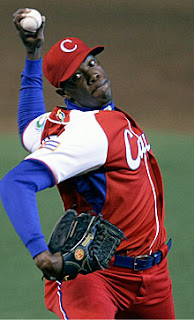Although I'm currently down in Austin, Tejas, waitin on the "3:10 to Yuma" (actually, it's the 2:16 to La Guardia, but it's delayed 'till 3:10) after spending the weekend doin the Texas two-step with my new Tejano in laws, I want to point your attention to a sharply written article by Haroldo Dilla that came out in the Dominican newspaper 7 dias today, Sunday, January 3, 2010.
The article, "
Y sin embargo, Cuba se mueve," is an incisive and critically-minded assessment of the back-and-forth between a group of mostly young Cuban artists and intellectuals who published an open letter condemning recent repressive, "bureaucratic-authoritarian" actions of Cuba's cultural commisars and blogger Yoani Sanchez whose own recent post both celebrated and criticized the letter's authors. (In a previous
post of my own, I gave a quick assessment of this dialogue and translated the entire letter and part of Sanchez's response to it into English).
Essentially, while Dilla grants that Sanchez has the absolute right to differ with and even criticize the letter's authors (in fact, he does so himself), he finds the language and tone she uses to do so
uncharacteristically intolerant - especially since she has gained her current position of influence through her own demand for and exercise of tolerance.
I disagree with his characterization of her criticisms.
While she does use harsh and somewhat dismissive language when referring to the socialist critics (e.g., "hate to say I told you so"; "what took you so long?"; "thanx, but no thanx"), Sanchez's larger, more important point is that
rights for only some (even if that "some" is broader and more inclusive of "autonomous, progressive projects" than is the rigid status quo) in the end it is
rights for none at all, since the rights, that wider tolerance, and those new spaces are purchased at the price of the exclusion from the debate about the present and future of Cuba of certain individuals, political positions, and points of view (for instance, Sanchez mentions Social Democrats, Christian Democrats, and Liberals).
In other words, Sanchez does not criticize the letter's authors because of their political position (autonomous democratic socialist), but because they seem to only demand and defend the right of greater autonomy and grass-roots cultural and social projects
within a revolutionary and explicitly socialist society - while leaving "
fuera del juego" (out of the game) anyone and everyone (like herself) who favors a change
OF the country's political-economic-social system.
That is, "cambios
DENTRO del sistema" vs. "cambio
DEL sistema". Or, as Fidel's old slippery "Words to the Intellectuals" put it: "
Dentro de la revolucion, todo; contra (or was it "
fuera de")
la revolucion, nada". The tricky and very tight spaces between those three words - "
dentro," "
fuera," and "
contra" - are what's at stake here.
Can those "
adentro" recognize the rights of those "
afuera" (
tanto afuera del sistema como afuera del pais) and even others who might even be explicitly "
en contra" to participate in the construction of Cuba's present and future (and vice versa), without resorting to coercion and violence? That's a tall order for a nation under historic threat from abroad and for a people whose talents and opinions have long embargoed by their own government...
While I will try to translate parts of Dilla's article later this week, in the meantime check out the original Spanish version
here and pasted below.
 Before I began writting El Yuma, I only regularly read two blogs: Yoani Sanchez's Generacion Y and Phil Peters' blog The Cuban Triangle.
Before I began writting El Yuma, I only regularly read two blogs: Yoani Sanchez's Generacion Y and Phil Peters' blog The Cuban Triangle. 




































